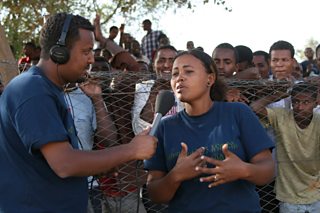Accurate information for healthier lives
Desalegn Assefa
Radio producer and presenter, Βι¶ΉΤΌΕΔ Media Action in Ethiopia

Desalegn Assefa interviews a young woman, Addis Ababa.
During my teens, questions about love, sex and identity worried me and the young people in my hometown of Gondar, Ethiopia. We guessed the answers because we could not openly discuss them with our families. My mind kept on chewing these questions but before I could find answers to them, I went away to college, where I focussed all of my energy on my studies.
Years later, back in my hometown, I met childhood friends who had grappled with the same questions. I found out that some of our friends had died of Aids, while others were living in poverty with the children they bore in their tender youth.
I knew that these problems came from a lack of accurate information on sexual and reproductive health, and that is why I spent four years producing and presenting the Abugida radio programme.
Abugida, which means A, B, C, D in Amharic, launched six years ago in partnership with the Ethiopian Radio and Television Agency (ERTA), alongside the first ever national reproductive health strategy. At that time, 51% of the Ethiopian population was under 18 years of age, but information on sexual health for young people was very scarce.
Early initiation of sex, high rates of rape and female circumcision, and poor knowledge of HIV and sexually transmitted infections (STIs) were just some of the challenges we faced.
While making sure to be culturally sensitive and appropriate, Abugida sought to open up discussions with young people on sexual and reproductive health using an entertaining format and featuring real life stories and honest advice.
The last episode of our award-winning programme broadcast last week and I have spoken to some people – from young listeners to government officials – about its impact.
Biruk, a first year student at Jimma University, told me that Abugida has been like a brother or sister to him. He confided that, “listening to Abugida since I was 12 has helped me to make informed decisions. If it were not for Abugida, my friends and I would have been in a lot of trouble.”
Yodit, a student, told me that she was “addicted” to Abugida, and enjoys its open discussions above all, while Yenework said that Abugida helped her understand the physical changes that she is going through as a young woman.
Last year a 19-year-old woman wrote to tell us that she had been raped at early age. After a professional counsellor replied, she started listening regularly to Abugida and said that she felt greatly relieved. When I last heard from her, she was finishing high school and preparing for university.
Those personal stories matter most, but official feedback also tells us that the Abugida formula worked. Hiwot Adane from the Health Ministry told me that programming like Abugida made significant contributions to the implementation of the national reproductive health strategy, while Bekri Naser of ERTA’s educational programmes, said that Abugida was an exemplary programme.
The Demographic and Health Survey 2011 report indicates that Ethiopia is registering significant changes in reproductive and sexual health. For example, about one-quarter of young women and young men who are sexually active were tested for HIV in the 12 months before the survey—a dramatic increase over the 2005 levels.
So what has been the key to Abugida’s success? I believe it was the programme’s fast-moving and lively style which reflects the real lives of young Ethiopians. The voices of young people themselves featured strongly, making it more likely that they would adopt more responsible behaviour patterns. Young women and their vulnerable position in society was a particular focus.
Although the Abugida door closed in August, Βι¶ΉΤΌΕΔ Media Action will open a new door in early 2013 when it begins training and mentoring Ethiopian producers to create health programming for mothers and families in Amhara and Oromiya. This is aimed at tackling some of the highest maternal and infant mortality rates in the country.
My recent conversations with young Abugida listeners reminded me of my youth in Gondar, and the questions that we young people had no answers for. It is a simple but very powerful idea that accurate information makes healthier lives, and that media can reach even the poorest and most marginalised people. I am looking forward to the next stage in our work, using the same energy and creativity that made Abugida work, and bringing that benefit of information to young, rural mothers and their families.
Related links
